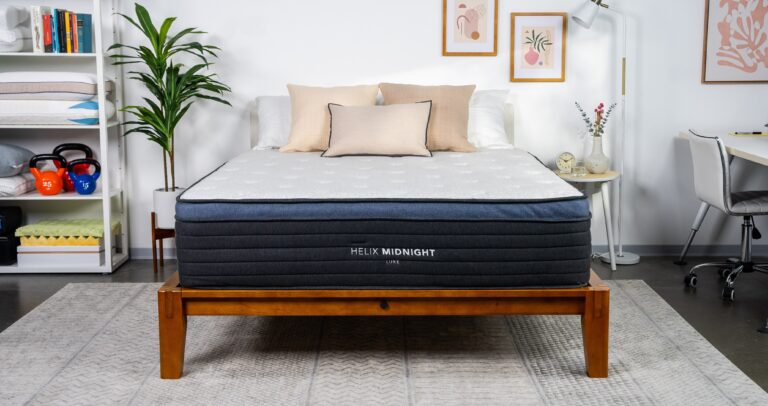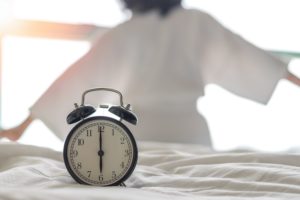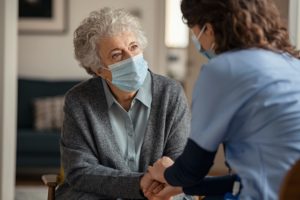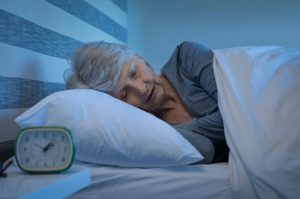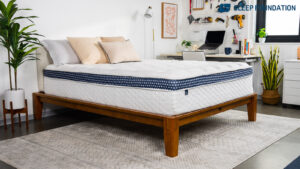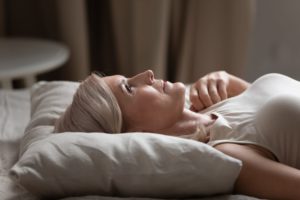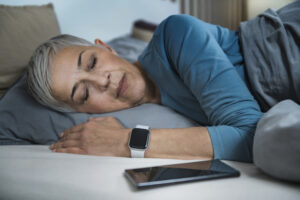Why Do Older Adults Wake Up Early?
- Waking up early in older adults is a common part of aging.
- Changes to circadian rhythms and less time spent in deep sleep can contribute to sleep disruptions and early awakenings.
- Older adults are more sensitive to changes in physical activity, light exposure, and room temperature, while also more at risk of health conditions and sleep disorders.
- Consult with a healthcare provider about medications or underlying health problems that may be affecting sleep quality.
Experts recommend adults, including older adults, get seven or more hours of sleep per night. However, starting in midlife, the average amount of time a person sleeps each night tends to decrease by 30 minutes every 10 years. Sleep-related complaints are common in older adults, with many reporting they wake up earlier as they age.
Older adults may wake up early for multiple reasons, such as environmental factors, or health conditions. Find out more about factors that impact sleep as a person ages, as well as sleep tips for older adults.
Why Sleep Patterns Change by Age
In adults 65 years and older, it can be difficult to determine whether sleep complaints are due to normal age-related changes, a health problem, or a specific sleep disorder.
Normal sleep changes in older adults include going to sleep and waking up earlier. The process of aging can cause a person’s circadian rhythms, daily bodily fluctuations that include the sleep-wake pattern, to weaken. These circadian rhythm changes can cause disrupted sleep and more daytime tiredness.
Also, older adults tend to get less deep sleep causing them to wake up more often throughout the night. Because of this tendency, older adults may feel like they sleep more lightly compared to when they were younger, and the transition between sleep and waking up may feel abrupt.
“With advancing age the need for sleep does not reduce, but the ability to get continuous & uninterrupted sleep does.”
Dr. Abhinav Singh, Sleep Physician
However, normal aging is not entirely responsible for sleep changes in older adults. In fact, research has found that many older adults experience sleep issues as a result of underlying health problems. Many other factors may contribute to these sleep changes, including feeling sick, being in pain, or taking medication that disrupts sleep.
Looking to improve your sleep? Try upgrading your mattress.
What Causes Older Adults to Wake Up So Early?
Older adults tend to wake up early for multiple reasons . Besides the general consequences of normal aging, older adults may have sleep disturbances that stem from a variety of causes such as environmental factors, health and hormonal factors, and chronic diseases.
Environmental Causes
Many environmental and lifestyle changes occur as people get older, which can contribute to sleep problems. For example, older adults who are retired may not have a fixed schedule, which can affect their sleep habits. In addition, retired individuals tend to be less physically active and less involved in social activity, which can contribute to sleep disturbances.
Many older adults may move to new homes or long-term care facilities later in life. This transition can be both physically and mentally taxing, and these stressors can also cause sleep problems or worsen existing sleep problems. Other environmental factors like noise, room temperature, and exposure to light can also impact sleep in older adults.
Sleep Apnea
Sleep apnea is a sleep disorder that causes pauses in breathing during sleep, often due to an obstruction in the airway to the lungs. The two types of sleep apnea, obstructive sleep apnea and central sleep apnea, are the most common sleep disorders later in life. Research shows that the prevalence of sleep apnea is 1.7 times higher in adults over 60 years old, compared to adults 40 to 60 years old.
Sleep apnea presents much the same way in older and younger adults. It often involves snoring and waking up in the morning still feeling tired. In older adults, other symptoms such as cognitive troubles and waking up throughout the night to urinate are more common as well.
Melatonin and Other Hormones
Sleep-related hormones and how they affect an individual’s sleep pattern can change with normal aging.
Melatonin is a hormone produced by the body that helps regulate sleep. Melatonin levels are at their lowest in the morning and throughout the day. Then, melatonin increases in the evening, prompting a person to feel tired. In older adults, evening melatonin levels may not rise as much compared to young adults. These lower melatonin levels may contribute to sleep problems in older adults.
Besides melatonin, the production of other hormones, such as cortisol, testosterone, and growth hormone, also tend to change with aging. These hormonal changes may result in waking up earlier or other disrupted sleep patterns.

Menopause
Menopause occurs 12 months after a person’s last menstrual period and can affect sleep. The transition into menopause, called perimenopause, typically lasts around seven years, but it can be up to 14 years. People in their menopausal years may experience symptoms such as hot flashes, mood changes, and night sweats, which can in turn cause sleep problems.
Furthermore, during menopause, certain sex hormone levels change significantly. Night sweats and hot flashes, which are symptoms of hormonal changes that can last well after menopause, can cause people to wake up early. These are also associated with difficulty falling asleep and staying asleep.
Dementia
People with dementia experience more changes to their sleep patterns compared to older adults without dementia. Dementia often involves having trouble with daily activities due to problems with the brain. This disorder can lead to sleep problems, including waking up frequently throughout the night.
Environmental factors associated with dementia can also cause sleep problems. For example, some individuals with dementia are exposed to little or no bright light each day due to either living at home or in a nursing home. A lack of light exposure affects circadian rhythms, including a person’s sleep-wake schedule.
Common Sleep Problems for Older Adults
Aside from sleep apnea, there are other sleep problems and disorders that are likely to affect older adults :
- Insomnia:Insomnia is a sleep disorder characterized by difficulty falling asleep, staying asleep, or waking up early. This sleep problem becomes more prevalent with age, affecting 30% to 50% of older adults.
- Restless legs syndrome (RLS): The sleep disorder restless legs syndrome involves an urge to move the legs at night and is often uncomfortable. Besides unpleasant feelings, people with RLS also feel restless and have trouble falling asleep. The likelihood of experiencing RLS increases with age and affects up to 25% of older adults.
- Rapid eye movement sleep behavior disorder (RBD): In rapid eye movement sleep behavior disorder, sleepers experience a loss of muscle control during a state of sleep called rapid eye movement (REM) sleep. This disorder often results in disrupted sleep. While not as common as insomnia or sleep apnea, this disorder does occur in older adults.
- Nocturia: Another potential cause of older adults waking up more during the night is nocturia. Nocturia is the need to get up to urinate throughout the night.
Overall, older adults who do not get enough sleep due to sleep disorders or other factors can experience effects such as:
- Irritability
- Depressed mood
- Memory problems
- More falls or accidents
If a person experiences these symptoms and struggles to do daily activities for more than two or three weeks, they should talk with their doctor about what they can do to get better sleep.
Sleep Tips for Older Adults
Even though older adults may have difficulties with sleep and waking up early, building a better bedtime routine may help them overcome these issues.
- Set consistent wake times and bedtimes: Experts suggest that people of any age can benefit from establishing a sleep schedule that involves setting consistent bedtimes and wake times. These should remain the same across all days of the week.
- Limit screen time before bed: Smartphones, electronic readers, laptops, and other handheld devices emit blue light, which can disrupt sleep. Avoiding technology before bed can help people fall asleep more quickly and reduce unwanted awakenings at night. Blue light blocking glasses are also an option if people have difficulty putting down their devices.
- Limit the use of certain substances before bed: Stimulants like caffeine and nicotine can keep people awake when it is time to sleep. On the other hand, alcohol before bed can make people feel sleepy, though it can cause disrupted sleep later in the night. Avoiding or limiting any of these substances before bed can help people get the amount of quality sleep they need.
- Find ways to get active: Exercise during the day can help people fall asleep more easily and improve their overall health. Older adults can talk with their doctor about an exercise routine that is right for them.
- Get plenty of exposure to natural light: Given the changes that occur to the sleep-wake cycle as a person ages, older people can benefit from natural light exposure, particularly in the morning hours.
Talking with a doctor about other healthy sleep habits can help older adults get the recommended amount of sleep.

Still have questions? Ask our community!
Join our Sleep Care Community — a trusted hub of sleep health professionals, product specialists, and people just like you. Whether you need expert sleep advice for your insomnia or you’re searching for the perfect mattress, we’ve got you covered. Get personalized guidance from the experts who know sleep best.
References
6 Sources
-
Consensus Conference Panel, Watson, N. F., Badr, M. S., Belenky, G., Bliwise, D. L., Buxton, O. M., Buysse, D., Dinges, D. F., Gangwisch, J., Grandner, M. A., Kushida, C., Malhotra, R. K., Martin, J. L., Patel, S. R., Quan, S. F., Tasali, E., Non-Participating Observers, Twery, M., Croft, J. B., Maher, E., … Heald, J. L. (2015). Recommended amount of sleep for a healthy adult: A joint consensus statement of the American Academy of Sleep Medicine and Sleep Research Society. Journal of Clinical Sleep Medicine, 11(6), 591–592.
https://pubmed.ncbi.nlm.nih.gov/25979105/ -
Feinsilver, S. H. (2022, July 29). Causes of impaired sleep including sleep apnea in older adults. In K. E. Schmader & N. Collop (Eds.). UpToDate., Retrieved February 5, 2023, from
https://www.uptodate.com/contents/causes-of-impaired-sleep-including-sleep-apnea-in-older-adults -
Neikrug, A. B., & Ancoli-Isreail, S. (2023, February 3). Sleep-wake disturbances and sleep disorders in patients with dementia. In C. A. Goldstein & R. Benca (Eds.). UpToDate., Retrieved February 6, 2023, from
https://www.uptodate.com/contents/sleep-wake-disturbances-and-sleep-disorders-in-patients-with-dementia -
NIH National Institute on Aging. (2020, November 3). A good night’s sleep., Retrieved February 6, 2023, from
https://www.nia.nih.gov/health/good-nights-sleep -
Li, J., Vitiello, M. V., & Gooneratne, N. S. (2018). Sleep in Normal Aging. Sleep Medicine Clinics, 13(1), 1–11.
https://pubmed.ncbi.nlm.nih.gov/29412976/ -
A.D.A.M. Medical Encyclopedia. (2022, July 21). Aging changes in sleep. MedlinePlus., Retrieved February 6, 2023, from
https://medlineplus.gov/ency/article/004018.htm


